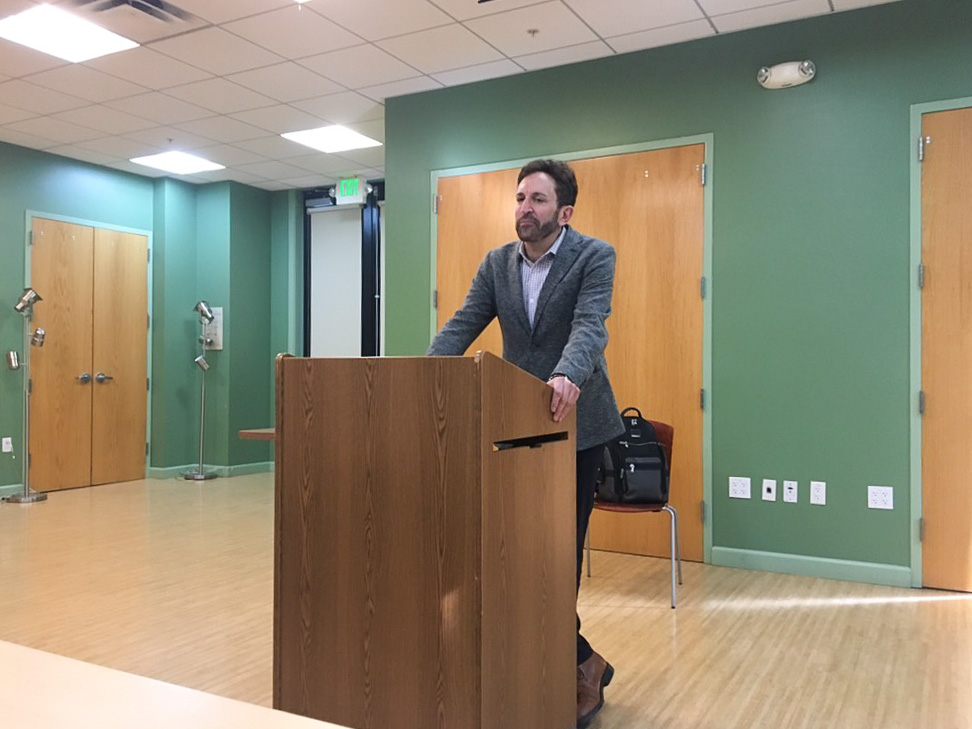Matt Nosanchuk ’87 JD ’90, a former senior attorney in the Obama Administration, spoke on Monday at a policy dinner hosted by Stanford in Government about his experiences as the liaison to the American Jewish community, his work on LGBTQ+ issues during the legalization of gay marriage and on securing support for the Iran Nuclear Deal.
The policy dinner was one of many talks in a series that make up POLISCI 22SI: “Issues in American Politics and Public Policy.”
Obama and civil rights law
Nosanchuk began his talk with a personal anecdote about how he first met former President Barack Obama — in the mid-1990s when he rejected an employment offer at a small law firm Obama had previously worked at.
“It just goes to show who you’ll meet along your path or career,” Nosanchuk said.
He then went on to talk about his work with civil rights in the Obama White House, explaining that although many were eager to work on LGBTQ+ issues, the administration often found itself in a challenging position.
“There were some significant legal barriers that stood in the way at the time,” he said. “You had a federal law on the books that basically defined marriage as between a man and a woman. You had a policy in the Pentagon that barred gays and lesbians from openly serving in the military.”
Nosanchuk also explained that he entered the Department of Justice (DOJ) during a “tense” time where the Obama DOJ’s default response was to defend the Defense of Marriage Act, which defined marriage as between a man and a woman, in the courts, despite the Obama administration’s opposition to the law. Nosanchuk also said that he found himself in an awkward position where he had to explain to the LGBTQ+ community why the administration wasn’t fulfilling its campaign promises.
“At the time, they felt like the Justice Department wasn’t moving fast enough and far enough and quickly enough to implement all these things Obama promised to do,” he said.
Nosanchuk went on to explain that the Obama administration’s prioritization of the Affordable Care Act often pulled efforts away from LGBTQ+ civil rights efforts, but that this changed after Obama’s first term. When Obama publicly came out in support of same-sex marriage equality, the Justice Department moved away from defending the Defense of Marriage Act.
“The president and the attorney general made the decision,” Nosanchuk said. “It was a momentous decision to stop defending this law and actually take the side of those challenging it.”
Iran deal
“The Iran nuclear deal was the capstone of President’s Obama foreign policy efforts,” he said. “President Obama felt like with respect with American foreign policy, too often there was a predisposition to wield and express American power through military force.”
Nosanchuk added that Obama believed “there were other ways for the United States to express its power as a superpower” through diplomacy.
Nosanchuk then discussed his role as the liaison to the American Jewish community. While the deal was controversial, the Obama administration felt that it wanted to reach out to the American Jewish population in particular. Nosanchuk attributed Israeli Prime Minister Benjamin Netanyahu’s continued pressure on the international community as one of the reasons why the administration chose to act on the Iran nuclear crisis.
“President Obama said I want a Jewish community outreach strategy. That came to me,” Nosanchuk said. “We developed this whole strategy that had President Obama speaking at a synagogue in Washington. He’s only the fourth president in U.S. history to address a synagogue. That was momentous.”
Obama missed part of his birthday dinner at one point in trying to persuade critical American Jewish community members to come out in support of the Iran nuclear deal, Nosanchuk added.
Heajune Lee ’21, a TA for the class, explained what she felt POLISCI 22SI gained from the talk.
“We learn a lot about the Iran Deal in class, but hearing about the White House’s engagement with the American Jewish community, which has a lot of stake in this issue, was a completely new perspective we didn’t know a lot about,” she said.
Tenzin Kartsang ’22, who attended, echoed those sentiments.
“I think it’s very interesting to hear insider accounts of the Obama Administration’s efforts in various policies ranging from Iran to LGBTQ+ rights,” he said. “I also think it’s imperative in today’s political climate that classes like POLISCI 22SI are offered to give students a chance to be aware of American political issues with exceptional guest speakers.”
This report has been corrected to reflect that Nosanchuk is a Stanford alumnus. The Daily regrets this error.
Contact Richard Coca at richcoca ‘at’ stanford.edu.
